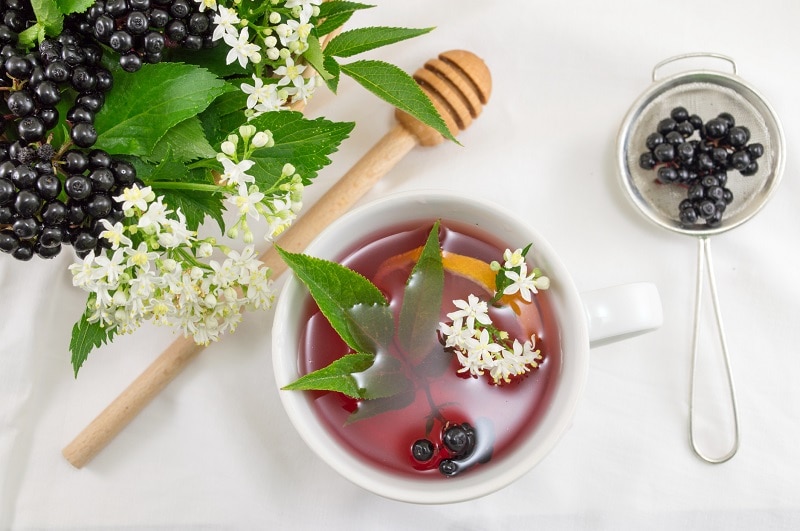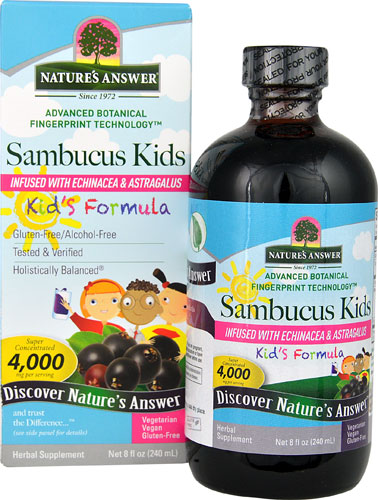Elderberry is recognized within the wellness space as an immune-supporting herb that promotes overall health. The discovery of its benefits dates back to Hippocrates, who valued the plant because of its health-supporting versatility.

In addition to supplementing with elderberry capsules, elderberry tea is also an easy way to
reap the benefits of this beneficial herb. It’s warm, comforting and serves as a natural immune-supporter.
What is elderberry tea?
Elderberry tea consists of the dried berries and flowers of the elder plant. They’re simmered in hot water, infusing the plant’s beneficial compounds into a sweet, comforting tea.
Like capsules and
syrup made from the plant, elderberry tea contains flavonoid antioxidants, including anthocyanins, which are found in superfoods like berries and cherries. These antioxidants help support a healthy immune system, and are capable of supporting overall neurological and cardiovascular health.
What does elderberry tea taste like? It has a naturally sweet taste from the berries, with earthy, sometimes described as tart undertones.
The benefits of elderberry tea
Research on the elder plant has been conducted for the last 20 years, investigating its antioxidant benefits and immune-boosting potential. Today, it’s one of the most well-known herbs because of its unique performance.
Here’s the general rundown of the benefits of elderberry tea:
- Supports a healthy immune system†
- Contains immune-supporting antioxidants†
- Helps promote healthy digestive function†
- Promotes skin’s healthy structure†
- May support heart health†
How to Make Elderberry Tea

It’s easy to make your own elderberry tea, and you’ll have the soothing effects on the body and mind.
- 2 cups water
- 2 Tbsp. dried elderberries
- In small saucepan, heat water. Add dried elderberries. Bring to boil, and then reduce heat. Simmer 10 to 15 minutes.
- Remove from heat and cool for 5 minutes. Strain berries through fine-mesh strainer. Stir in additional herbs or sweeteners.
Stock up on organic dried elderberries at Vitacost.

How to flavor elderberry tea
During the simmering process, add
cinnamon and/or
turmeric for added flavor and additional beneficial compounds.
To sweeten elderberry tea, add a natural sweetener, such as
raw honey or
stevia, after the tea has been strained and cooled.
If you’re looking to enjoy elderberry tea during the hotter spring and summer months, you can pour it into glass cups and refrigerate for a refreshing iced tea.
Don't have time to make elderberry tea? Try
Elderberry. It features a fermented elderberry and probiotic blend.
It was formulated with a select probiotic to withstand harsh conditions to deliver benefits like support for a healthy immune system, gut-related immunity and immune system activation.
Consult your healthcare professional before starting any new dietary or lifestyle regimen, including using dietary supplements such as elderberry or drinking elderberry tea. If you are using an herbal product, follow label directions and suggested use guidelines.
Elderberry has gained popularity in the wellness space as an immune-system supporter, and for good reason. It contains powerful antioxidants and when combined with a tough strain of probiotics, it helps to support immune and gut health.
In addition to supplementing with a high-quality elderberry capsule, drinking elderberry tea is an excellent way to receive the plant’s beneficial compounds.
Written by Jill Levy. Jill has been with the Dr. Axe and Ancient Nutrition team for five years. She completed her undergraduate degree in Psychology from Fairfield University, followed by a certification as a Holistic Health Coach from the Institute for Integrative Nutrition. Jill takes a “non-diet” approach to health and really enjoys teaching others about mindful eating, intuitive eating and the benefits of eating real foods.
 In addition to supplementing with elderberry capsules, elderberry tea is also an easy way to reap the benefits of this beneficial herb. It’s warm, comforting and serves as a natural immune-supporter.
In addition to supplementing with elderberry capsules, elderberry tea is also an easy way to reap the benefits of this beneficial herb. It’s warm, comforting and serves as a natural immune-supporter.





